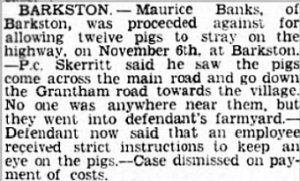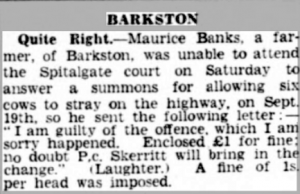Jack Banks
Jack Maurice Banks was born in Lincolnshire on 25 Oct 1921. His parents, Maurice (a farmer) and Dorothea (nee Leeson) had married in Louth, but by 1930 the family were at Syston Grange and they later moved to Barkston House.
Jack attended Barkston School and then Kings School, Grantham (1933-37). He became an apprentice artificer. In 1938 (aged 17) he was in Manthorpe and became a volunteer with 6th Battalion, Lincolnshire Regiment (Territorial Army). The battalion was called up when war was declared in 1939 but when they were sent to Norway, Jack, being only 18, was not allowed to go with them. He therefore transferred to the Royal Fusiliers and served on anti-aircraft searchlights in Norfolk, where he was quickly promoted to Sergeant.
Wanting to see more action he relinquished his rank and transferred to 13th (Lancashire) Parachute Battalion (formed from the 2nd/4th Battalion, South Lancashire Regiment in May 1943).
His unit dropped into Normandy on D-Day (6th June 1944). The first parachutists jumped from Dakota and Albermarle aircraft, landing north Ranville, near Caen at 0050. They were reinforced by glider-borne troops and spent the next 3 weeks holding the area against German counter attacks, under frequent mortar and artillery fire.
The biggest attack was against B Company on 10 Jun. Jack was reported missing that day and was later assumed to have been killed. His body was not identified and his name is on the Bayeux Memorial.
Jack’s name was added to the Barkston war memorial when it was repaired in 1954. His father, Maurice, who by that time was chair of the Grantham branch of the National Farmers Union, unveiled the restored memorial. Maurice and Dorothea stayed in Barkston. She died in 1962 and Maurice in 1979.

